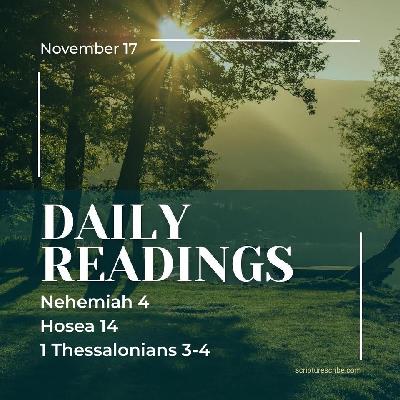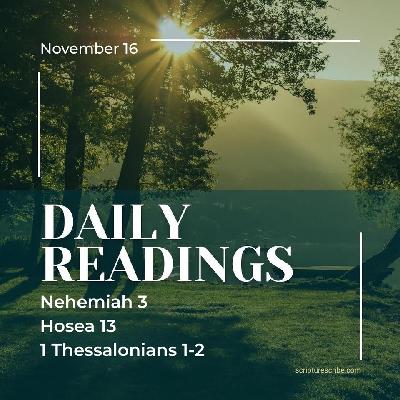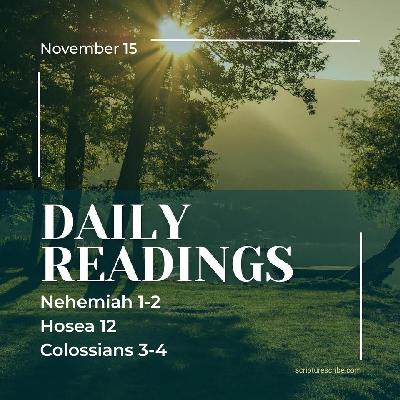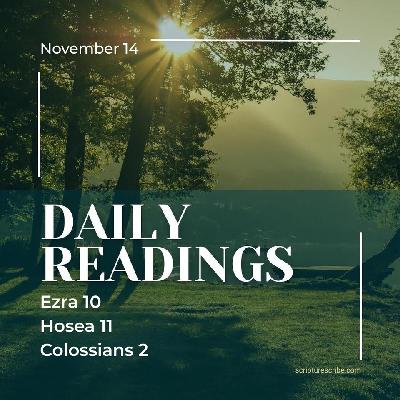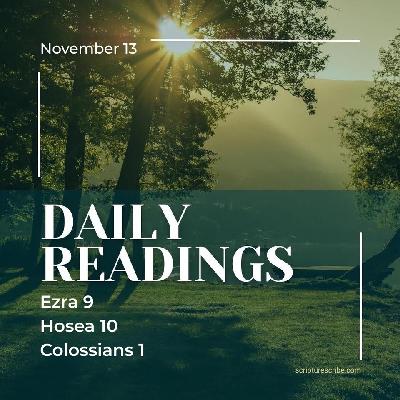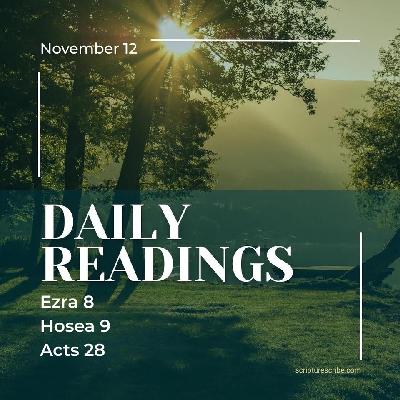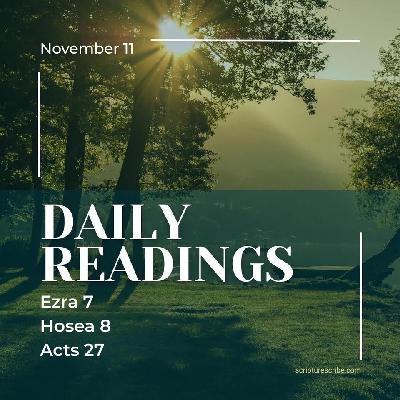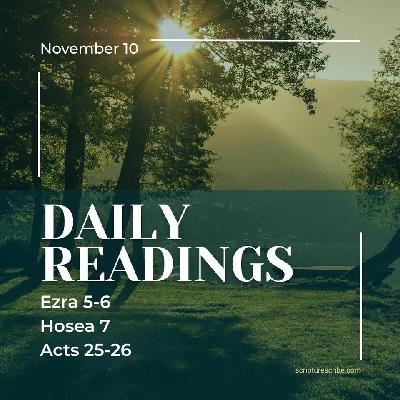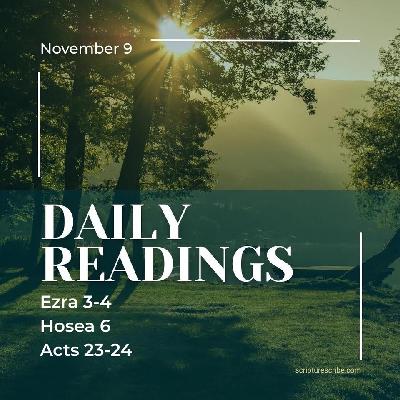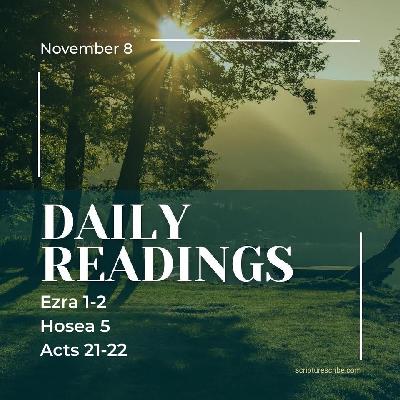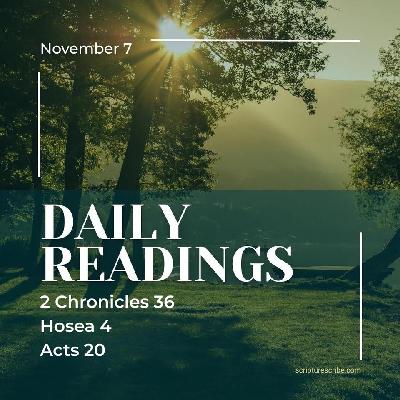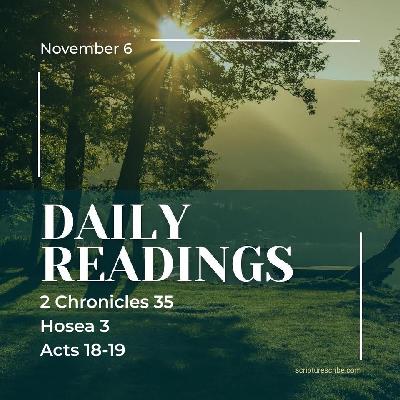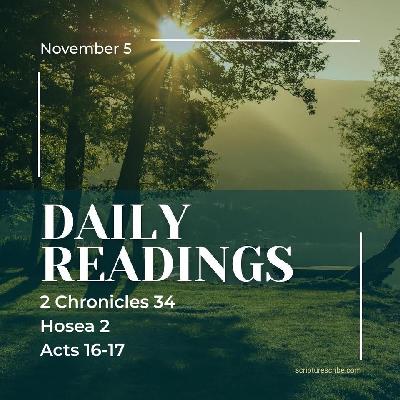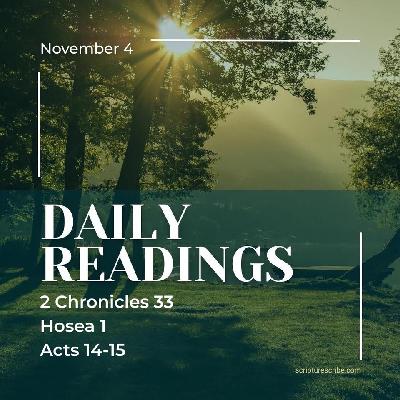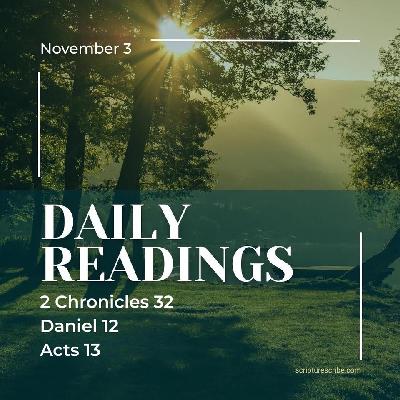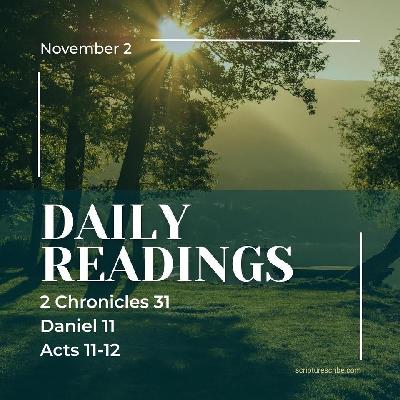Discover The Bible Standard - Discover the Truth.
The Bible Standard - Discover the Truth.

1055 Episodes
Reverse
Nehemiah 4 tells of the mockery that comes from the Jews' enemies in an attempt to discourage them from the work of building the wall. Nehemiah makes it a matter of prayer to his God. Likewise, the people of the LORD were not diverted from the work. The enemies next threaten sabotage and open attack upon the rebuilding work. This too fails because of Nehemiah's diligence and the measures he takes for constant surveillance and the protection of the builders. Nehemiah places each family working on the wall directly in front of their home. Each worker works with a weapon in one hand.
Hosea 14 tells of a plea to Israel to return to Yahweh. The nation needs to consider why they had been smitten and to find suitable words to request God's healing and forgiveness. Then the Almighty's anger will be turned away. In poetic language the prophet describes how blessings will return to Israel. In forsaking idolatry and learning the just and upright ways of Yahweh the faithful will thrive and experience the bountiful blessings of our Lord Jesus Christ's coming kingdom.
1 Thessalonians 3verses1-5 Paul tells us of the sufferings that the Apostle experienced in Athens. Next Paul informs his readers of the great encouragement and comfort that Timothy brings him; and it is the news of the Thessalonians' magnificent response to the gospel. Note how the chapter finishes - read aloud verses 12-13 and pause, and ponder. Chapter 4 speaks of how pleased God and Paul are with the way that the believers are living their lives as a witness to their faith and to their trust in God and His Son. The love the Macedonian believers show to each other is evidence that they have learned what God's Word teaches. They needed to keep working until the Lord Jesus' return. These believers did, however, have a wrong view about the order of events after the Lord's return. The living believers will have no time advantage over those faithful who had fallen asleep in Christ i.e. died. Verses 13-18 describe what happens at Christ's return to the earth. Jesus will come with angels and the trumpet of God (1 Corinthians 15verses52-53). Those believers who are alive when he comes will be caught up together with those believers who have been raised from the dead, into a great cloud of witnesses (see Hebrews 12verses1- 2). These believers will be caught into the air i.e. aerial, in the sense that, together with their Lord Jesus Christ, they will be the rulers (or those elevated to be in authority) over the people of the earth - i.e. the subjects of that coming kingdom. What a comfort to those who are now suffering persecution.
Thanks for joining us - we pray you found these comments helpful in your appreciation of God's words, join again tomorrow
Nehemiah 3 tells the readers of Judah's consecrating of the gates and the rebuilding of the wall. It contains lists of who built, and why they built. All classes from professional craftsmen (goldsmiths) to common labourers worked - including the high priest Eliashib and his 5 daughters. Sadly, it also listed some, such as the nobles of the Tekoites, who to their shame failed to become involved in the building of the wall.
Hosea 13 tells of the LORD's relentless watching over Israel (v7) "like a leopard by the way". Their idolatry would be visited with chastisement, as of a devouring lion. The king they sought in their beginnings - Saul was given by God in His anger and taken away in His wrath. The same remained true for every king from Israel (the northern kingdom). However, the loving kindness of Yahweh is stated in verse 14, which is cited with regards to the blessings of the resurrection in 1 Corinthians 15verses54-55. But for the time being their discipline remained a necessity.
Paul's first visit to the Thessalonians (in Macedonia) was perhaps around 51 AD. The letter commenced with "grace" (Greek ‘charis' - love) and "peace" (Hebrew ‘shalom' - wholeness, or peace), which come from God, our Father. As a group of Christian believers, the Macedonians were severely persecuted, like their fellow Jewish believers in Judea - many of them being put to death for their beliefs. The Thessalonians were, however, extremely generous in financially contributing to Paul's preaching - especially the Philippians. The central message of both letters is the second coming of Jesus Christ to set up the kingdom of God on earth. Every chapter of both letters refers to this - some chapters containing several references (in the Bible we find over 500 references to the second coming of Jesus Christ). Their
love and labours for the Truth were exemplary to all believers. Note verse 9 refers to their belief in "the Living God" and cites not only the verse in Jeremiah 10verses10, but the whole context of Jeremiah 10 was relevant to the situation of the Thessalonian believers. Chapter 2 speaks of the love of Paul, Silas, Timothy and Titus among them. Interestingly the name Titus means "nurse", or "rearer". Paul worked to support his companions' needs and for the preaching of the gospel. The Apostle commends the believers for their patience in suffering persecution. Finally, he expresses a desire to see them again and says that in the day of Christ's coming their acceptance of the gospel would be his victor's crown (Greek 'stephanos').
Thanks for joining us - we pray you found these comments helpful in your appreciation of God's words, join again tomorrow
Nehemiah was cup bearer to the king of Persia - an exalted and esteemed position. He had just received news from Hanani of the terrible condition of the walls and gates of Jerusalem. The year was about BC 469 and as soon as Nehemiah heard these words he prayed and fasted for several days acknowledging his sins and those of his people, which had brought this terrible situation. He acknowledges Yahweh's righteousness and His loving kindness quoting from the Law of Moses, as told in Deuteronomy. Chapter 1 concludes with the implication that Nehemiah intended to take up the matter with king Darius. The next chapter tells of Nehemiah in the presence of the king with his face showing a sadness of heart - this was forbidden by the law. Nehemiah who, the book shows to be a man of prayer and action, is questioned by the king as to what the sadness might mean - is there a plot against the king? Whereas the prayer of chapter 1 was over many days this time this prayer is a brief spontaneous momentary prayer requesting God to cause the king to favourably listen to Nehemiah's prayer. The response of the king was to grant Nehemiah extended leave to return to Jerusalem to fix the problem. In verses 9-10 we are told of the Persian king's support for Nehemiah. We are also told about the disturbance this created among the Jews' enemies. After 3 days of thinking about the size of the problem before him Nehemiah arose at night and secretly inspected the walls. So that ownership of the problem would occur, Nehemiah asked the rulers what they would recommend be done. Their answer was, "Let us rise up and build". This only served to strengthen the opposition they faced. Nehemiah told Sanballat, the Horonite (i.e. Edomite), Geshem - the Arabian; and Tobiah- the Ammonite and servant to Sanballat - that these enemies had "no portion or right or claim in Jerusalem" (2verses20 ESV).
Hosea in chapter 12 speaks of Israel's falsehood to God and even to the Assyrians also so that Egypt came and punished them. Verses 2-14 speak of the LORD's quarrel with both the northern kingdom of Ephraim and the southern kingdom of Judah. These verses tell in a parable what both kingdoms needed to learn - and of course the lessons are equally true for us. Hosea tells us that Jacob was from the time of his birth until the night before his confrontation with Esau a deceiver to whom God was teaching lessons by continuously exposing Jacob to deceivers far worse than himself - particularly Laban, who was both his uncle and father-in-law. When Jacob was faced with a dilemma that he could not solve God compounded the problem for him by dislocating Jacob's hip (read Genesis 32). Now Jacob was forced to rely on God, rather than his own resourcefulness, and to now have finally learnt that all along he should have left the solution to his problems with God. The summation of Jacob's life given by God, through Moses, was that Jacob was a "plain" (Hebrew "just", or "upright") man - this meant he always tried to be godly, but had to wrestle with traits that were strongly part of his heritage. The greatest lesson of his life was to learn to TRUST God. Hosea tells us that now Jacob having found God at Bethel (the house of God) tells us to learn the same. Deuteronomy tells us that when they gave their tithes to Yahweh that they were to recite, "A Syrian ready to perish was our father" (Jacob). For us the great lesson from the life of Jacob is recorded in verse 6 - read aloud, pause and ponder. Despite what Israel and Judah had done God would restore them in His loving kindness, as the remainder of the chapter indicated. Verse 13 indicated that Yahweh chose to work through those whom society sees as misfits- Moses was but a prophet.
In Colossians 3 verses 1-4 tell us that since we have through the act of baptism been raised in him to a new life our thoughts and actions should be in harmony with this. And so, from verses 5-9 all those past behaviours are to find no place among believers. Our new self is being renewed every day through our growth in understanding what it means to be "in Christ". From verses 12-17 the focus of the believer's mind and actions is to centre on living with (and as) Christ. From verses 18 to the chapter's end, he addresses the different groups within Christian households and advises on proper behaviour. Chapter 4 continues with instructions for masters and servants - such an important topic as five sixths of the Roman world were slaves. Verses 2-4 is a request to those at Colossae to pray for Paul's preaching.
Verse 5 tells that their speech and behaviour must be sincere at all times - "seasoned with salt". Verses 7-17 conclude with final greetings. Verse 18 tells us that the letter was written by Paul in his own handwriting.
Thanks for joining us - we pray you found these comments helpful in your appreciation of God's words, join again tomorrow
The Life Of Christ # 115 The Feast of Dedication by John Martin
In Ezra 10 we read of the renewal of the covenant and a commitment to be faithful to the marriage covenant that Yahweh had made with Israel. The chapter speaks of Ezra and the exiles' acceptance of the
covenant's solemnity was demonstrated by their declaring that they would only marry wives within the covenant bonds. After three days all the people assemble before the house of God trembling because of the solemnity of the occasion and the heavy rain. The rain meant that they needed delegated officials to stand for them in these matters. The assembly together with Ezra discussing this matter and determining to do what God had commanded. The Senior officials of the assembly are guilty of marrying out of the truth and they are named in the balance of the chapter. Those officials are required to put away their foreign wives in order to preserve the integrity of Israel's covenant with their God and maintain the truth faithfully.
Hosea 11 tells of God's covenant love for His son Israel. Yahweh calls His son "out of Egypt", as the book of Exodus attests and at that time Yahweh gives to them His covenant name as evidence of His purpose with His people. Matthew 2verses15 cites Hosea 11verses1 and applies it to the Son of God - the Lord Jesus
Christ. The verses in chapter 11 which follow speak of the nation's resistance to their Father. As a Father the Almighty took Israel by the hand and trained them to walk in His covenant way. Despite their perverse heart in wanting to go back to Egypt Yahweh would not give up on them (verses 8-9); but in the time of their chastisement they would eventually again seek Him.
Colossians 2 together with Romans 6 provides the most complete description of what baptism is and what it achieves. Verses 1-5 tell us that in Christ we find a complete embodiment of the wisdom of God in a single individual. So we, the body of believers need to model and pattern ourselves on the Lord Jesus Christ. Verses 9-10 tell us that all can know about the Almighty is to be found in Christ. Verses 11-15 describe what baptism is - it is like circumcision in that it tells us that "in the flesh" - that is within our nature (dwells nothing innately good). There is nothing in human nature that can do anything good for God. And so human nature is rightly related to death. In dying Christ destroyed a body identical to ours - in that every sin which has been done could have been done in Jesus' body. The Jews and Romans were driven by the lusts of their natures to try to destroy our Lord Jesus Christ. But by not yielding to the passions which controlled his enemies our Lord victoriously triumphed in his sinless death. That death on the stake was a demonstration of the truth that human nature is rightfully related to death. Only when the lifeless body of our Lord hung on the stake was sin conquered in him and in his resurrection the process of salvation completed for him - and by establishing a basis for our forgiveness and thereby the way for our salvation. Therefore, in crucifixion Jesus destroyed sin (called in Hebrews 2 "the devil"). So, from verses 16-21 Paul tells the Colossians to focus on the pivotal and central teachings of the truth, and not to be distracted by side issues.
Thanks for joining us - we pray you found these comments helpful in your appreciation of God's words, join again tomorrow
Ezra 9 tells of the problems of those who had married nonbelievers. Verse 4 tells that the rulers and officials had been at the forefront of those who had disobeyed God's command about this. The reader should look at Malachi 2verses10-16 and Nehemiah 13verses23-27 to understand Yahweh's views on this subject; and why His prophets were so strong in denouncing this practice. From verse 10-15 Ezra seeks God's forgiveness of His people for their wrongful ways in marrying out of the Truth and counsels all of God's people to forsake that dangerous and evil course.
Hosea 10 tells of a vine that produced no fruit for God. How often do the prophets and the Lord Jesus Christ take up this theme cp Isaiah 5 and consider the number of references in the last week of our Lord to the barrenness of the fruitless, but showy fig tree. Also see John 15 where our Lord comments on himself being the vine. Without fruit a vine is useless - its wood is poor fuel; its wood cannot be used to make anything. We are useless unless we are producing the fruit of the spirit for God in our lives (see Galatians 5verses22-25; and Ephesians 5verses8-16). But for Israel when the LORD looked at their actions, instead of fruit, He saw poisonous weeds. Instead of sincere worship of Yahweh He saw the idolatrous calf worship. Bethel (meaning "the house of God") becomes Bethaven ("the house of vanity" - or "nothingness"). The result of this would be the delivering up to captivity of Israel to nations who were themselves ruled by idolatry. Israel's sinfulness was evident from earliest times, even when the Tabernacle was at Gibeah. The Lord God would again bring them under the yoke, when they will finally learn righteousness and will open their hearts to God as the poetic symbol of breaking open the fallow ground of their hearts suggests. By doing this God would be able to rain blessings on them. But the coming judgment would be a necessary part of helping Israel to learn this.
Paul sent the letter to the Colossians in about 62 AD. He never personally visited the region where there were two groups of believers - one in Colossae and the other in Laodicea. The one letter was read by both at this time and about 34 years’ time when another letter was sent in 96 AD by the Lord Jesus Christ. The area was exceptionally fertile and lay in a very rich valley. The epistle commenced with the greeting "Grace ('charis' the Greek greeting) and peace ('shalom' the Jewish greeting) coming to the believers from God our Father. This is followed by thanksgiving and prayer for their faithfulness in the gospel as reported to the Apostle from Epaphras. The believers were increasing in knowledge and love. But the greatest of all thanks was to be expressed to God, our Father, who had "qualified us to share the inheritance of the saints in light ... and has transferred us to the Kingdom of His beloved Son" (verses 12-13 ESV). Then from verses 14-23 Paul tells us of the pre-eminence of the Lord Jesus Christ the Son of the Father. Our Lord Jesus is the beginning (Gk 'archegos') and head of God's new creation and is the firstborn (Jesus firstborn by birth, death and resurrection) of that creation; the firstborn from the dead to be raised to eternal life. Verses 24-29 tell of Paul's suffering for all Gentile believers, that he might share and participate in the sufferings of Christ (as part of his body, which we, the ecclesia are). In verse 27 we have the key verse and theme of the book, "Christ in you (i.e. each of us) the hope of glory".
Thanks for joining us - we pray you found these comments helpful in your appreciation of God's words, join again tomorrow
Ezra 8 gives the genealogies of the returning exiles. This information is most important to Ezra the priest. It is necessary that only those whose genealogies for the priesthood could be proven would be put into the priesthood - the same applied to the Levites. Genealogies often seem boring to us, but the
genealogies are most important to those whose names are recorded. Nothing happens by accident in the life of Ezra - a small group are travelling with vast treasures of the Temple and have no guard provided by the king. However, they are never without protection - the God of heaven is with them. Nonetheless they do not presume on Yahweh's support - for three days they fast and pray seeking the Almighty's protection. Ezra cannot ask king Darius for protection - for that would demonstrate a failure to trust in the LORD. Ezra and the returning exiles offer burnt offerings and sin offerings and depart for the Land having angelic protection.
Hosea 9 tells that because of Israel's unfaithfulness they are to be taken captive into Egypt. Memphis is the central city of Egypt's gods and is the place of enslavement for idol worshipping Israel. From a promising beginning our God finds His people have treacherously turned from Him to commit idolatry. This shows that their trust is in the nations surrounding them, rather than in their God. The chapter concludes in verse 17 with Israel becoming outcasts among the nations.
Acts 28 tells of the entire company of the ship arriving safely on Malta at a place today known as St Paul's Bay. Here the ship's company will remain over winter until Paul journeys to Rome. The night of their arrival is cold and wet. A fire is kindled to dry them and to provide warmth. As Paul assists with the gathering of wood for the fire a venomous viper comes out from the fire and sinks its fangs into Paul's hand. The superstitious locals think Paul must have been a murderer who having escaped the vengeance of the sea is now being punished by God. Paul shakes the snake into the fire. The locals watch Paul waiting for him to convulse, swell up and die an agonising death - none of these things happen. So, they change their minds into thinking that he must be a god. Paul now is lodged for three days with the chief man of the island named Publius. Publius' father is sick with dysentery; but is miraculously healed by the Apostle. After leaving Malta three months later Paul takes a ship to the mainland where the journey to Rome continues. Along the journey Paul is given the privileges not normally given to a prisoner. The Apostle stops and meets several groups of believers on his journey to Rome. In Rome he calls together the local Jewish leaders and explains why he is in Rome. These Jewish leaders had received no information from any other Jews concerning Paul. After discussing his case it is thought that he might be set at liberty. The Apostle says that he was left with no alternative than to put his case before Caesar when the Judean Jews objected to his being released. The Roman Jews reveal that they have heard that the Christian sect is everywhere spoken against. A large gathering of Jews comes to Paul's place of residence at an appointed time. The aged Apostle tells them from morning to evening the message of the prophets. Paul concludes his address with the words of Isaiah 6 in chapter 6 which prophesied Jewish opposition to the Gospel message. The great Apostle claims that the Gentiles will favourably respond to the teaching of Christ. The book of Acts commenced in chapter 1verses8 with the need for the gospel to be
taken "to the uttermost parts of the earth" and concluded with that task being completedverses see Jesus great commission to the Apostles in Mark 16verses15-16. And also, after Paul's miraculous preservation after having been bitten by a venomous viper recorded in Acts 28verses3verses5 compare with Mark 16verses17-18. Two years expire and as no case is brought against Paul he is released to continue his preaching. All of these things occur before the fire in Rome and the intense persecution which came upon believers by the Emperor Nero from that time onwards. The 31st verses of Acts 28 is an epitome of the entire bookverses "Preaching the kingdom of God, and teaching those things which concern the Lord Jesus Christ, with all confidence, no man forbidding him."
Thanks for joining us - we pray you found these comments helpful in your appreciation of God's words, join again tomorrow
Ezra 7 tells of the personal qualities of Ezra the priest - verse 6 skilled in the Law of Moses that Yahweh had given Israel; verses 9-10 Ezra had set his heart to study God's Law and therefore the good hand of God was upon him (what a lesson to us); and Ezra graciously thanked the Almighty for His loving kindness ('chesed') shown to His people Israel (verse 27). The chapter tells of king Darius' generosity and material support for the work of building the temple; and the king's command to the Governors on the east of Jordan to materially support the project. King Darius warns of the serious consequences which would come to any who would not support the building.
Hosea 8 tells that because Israel had failed to obey God's laws they would experience great punishment - "they had sown the wind, they would reap the whirlwind" - the teaching of the Bible is that whatever we do produces consequences and that we are responsible for our actions (read aloud Galatians 6verses7-10 pause and ponder). The idolatry of Israel would incur God's judging them by using another idolatrous nation. Rather than turning to God for help Israel hires foreign armies. This causes them greater problems. For the kingdom of Israel in the north the time of destruction was upon them.
Acts 27 tells of Paul's journey to Rome for his case to be heard by the Emperor Nero. The ship sets sail in fine weather with only Luke accompanying the Apostle Paul on his voyage. The ship soon finds sailing difficult because of the opposing winds. When the ship reaches Crete it has now become too dangerous for sailing; and Paul advises that they should stay in Crete until the winter passes. But the owner of the ship was determined to reach Rome as quickly as possible to receive his profit. The Roman Centurion
decides to accept the ship owners' position and to continue on their journey. The ship is now beset with a hurricane-like wind called Euroclydon. The crew takes many measures to try to save the ship and its precious cargo. Nothing works and their lives are entirely at the mercy of this horrible storm. All on board the ship become depressed and for fourteen days eat nothing. Then Paul, after receiving a vision from an angel of God, takes control and encourages everyone. The Apostle gives thanks to God and they all eat. After that the ship is lightened by throwing overboard the wheat from the hold. There are 276 people on the ship. Some of the sailors pretend to let down anchors under the ship, but their intentions are to flee in the lifeboats. Paul says to the Roman Centurion (Julius) that unless the sailors stay on the ship all lives are in danger. Julius stops the sailors from escaping. When daylight comes the crew run the ship into a creek which sees the rough sea smash the ship to pieces. All escape safely to shore - some swimming and others being carried by the current on planks of wood from the broken ship. Acts 27verses31 makes the nice point that unless we abide or remain in the Christ ship we cannot be savedverses compare John 15 our fruitfulness and salvation is dependent on us abiding in the Vine of God - His precious Son our Lord Jesus Christ.
Thanks for joining us - we pray you found these comments helpful in your appreciation of God's words, join again tomorrow
Ezra 5 tells of the work of building the house of God recommencing with the prophets of Yahweh - Haggai and Zechariah - supporting and encouraging the work. Still the attempts to frustrate the building came from Tatnai, the Governor on the other side of the river (the Jordan). The faithful Jews continued building while Tatnai's letter was sent to Darius (the Persian king). The Jews faithfully answered as to why their realm had been overturned and to their obedience to the God of heaven and the decree that came from king Cyrus to rebuild Jerusalem and the temple. The Jews suggested that search be made in the Chronicles of the kings of Persia to prove their claim. Chapter 6 tells us that the search was made in the
house of the scrolls in Ecbatana proving the accuracy of the Jews' claim. A letter came from king Darius asking Tatnai and his people to materially support the building of the temple. Verses 15-18 report the completion and dedication of the house of God. From verses 19-22 we read of the great joy as the new kingdom of Judah kept the Passover. Let us be daily builders of God's House and let those labours bring joy to our hearts.
Chapter 7 of Hosea contains some very graphic Hebrew poetry. From the rulers of the nation to the common people they were so intent on sexual depravity that they are described by the figure of a baker with an overheated oven. They had no shame for what they were doing. Another of the figures sees them as a dove that cannot make up her mind on whom to dote - Egypt, or Assyria. God wanted it otherwise and even when judgment was brought on them they didn't repent. A soft and penitent heart is always to be found among the LORD's children.
In Acts 25 we are told that, when Festus was determined to send Paul to Jerusalem, the Apostle had no alternative but to make his appeal to Caesar. After a short period of time Festus conducted another hearing of Paul's matters. Festus once again sought the favour of the Jews and at this time Paul announced that he would exercise his right as a Roman Citizen to be judged by Caesar. Herod Agrippa and his wife Bernice were visiting Caesarea and at this time Festus requested they hear Paul's case for Festus was struggling with the wording of the charge against Paul. Festus explained to Agrippa that to him there was no capital crime, but simply matters concerning Jewish law. With great pomp and ceremony Agrippa, Bernice and all the other dignitaries entered the judgment hall. Festus was seeking Agrippa's opinion on the nature of the charge to appear on the letter to be sent to Caesar. Chapter 26 records Paul's defence and appeal to Agrippa to embrace the Christian cause. Paul tells his audience of his fervour for the Jewish way and his concerted opposition to Christianity. But when he was confronted by the risen Lord Jesus Christ on the road to Damascus everything changed. He told the audience of his great commission and then knowing king Agrippa to be a man who read the prophets he appealed to the king to adopt the Christian belief. Festus, being embarrassed by the situation, attempted to finish the hearing immediately by declaring Paul to be mad due to his great learning. Paul was not to be silenced so quickly and continued to ask Agrippa whether he believed the prophets. He stated plainly I know you believe them king Agrippa. At this point king Agrippa and all the dignitaries rose and left with the king stating Paul's innocence. Let us remember that we are bondslaves to our Lord Jesus Christ and as his prisoners let our testimony burn before all to whom we witness.
Thanks for joining us - we pray you found these comments helpful in your appreciation of God's words, join again tomorrow
Ezra 3 opens with a magnificent statement of unity of purpose - the whole nation gathers as one man. They come to build the altar, the focus of the nation is to be as a whole burnt offering living their lives in dedicated service to their God. The returned exiles next keep the feast of booths, or Tabernacles, in fellowship with each other and in acknowledgment of Yahweh's provision of all that they had received at His bountiful hand. The building of the temple begins on the first day of the seventh month and the laying of the foundation was accompanied with great rejoicing and the singing of David's psalm of thanksgiving composed for the time when the ark was brought to Jerusalemverses 1 Chronicles 16verses8-35. The focus of this Psalm is Yahweh's "chesed" - steadfast and enduring love. Chapter 4 opens with the enemies of Judah
asking Ezra the Governor and the returned exiles to cease their work. They attempt to discourage and intimidate the builders with fear. When this doesn't work they write to the Persian king pointing out the risk to his realm should the Judean kingdom be reestablished. The adversaries rejoice when an order comes from the Persian king to cease the work. The work was halted for about 20 years and at the end of this time the Almighty stirs up two prophets - Haggai and Zechariah - to revitalise the people's spirit through several prophesies spoken in close succession. How unfortunate at the end of the chapter that unity is broken by the inability to get over "the good old days." Odious comparisons dampen ecclesial unity.
Hosea 6 tells of a plea to return to the LORD who had torn Israel, but would again restore them in two days (each of a thousand years on the principle of a day for a 1,000 years- see 2 Peter 3verses8). Then in Israel's restoration under the Lord Jesus Christ - the Messiah - times of great blessing will come. Read aloud Hosea 6verses6 pause and ponder. Blessings require Israel's responding as God always desires (see Christ's comments in Matthew 9verses13). But Israel deal treacherously and even Gilead a city of the priests becomes the place of violence and robbery. Shechem another city of refuge where elsewhere in Scripture a place focussed on now a place of violence and corruption. sincerity and truth a den of robbers whose corrupt words and ways shamed this otherwise national place for dedication to Yahweh. Shechem also now becomes a den of robbing priests.
Acts 23 tells of Paul before the Sanhedrin. In a similar way to when our Lord Jesus Christ appears before them, the hearing commences with an illegality from the High Priest, Ananias. That corrupt priest commands that the Apostle be smitten on the cheek - this is contrary to the Law of Moses. Paul reacts to this violation by saying that God would in His time smite the high priest. For this answer Paul is rebuked by those of the Council. The Apostle says he had not recognised the high priest. This seems unusual as in Acts 9 this high priest had given letters to Paul authorising the persecution at Damascus. Some such as Ramsay have suggested Paul's eyesight was poor, due to malaria possibly contracted on his first missionary journey. Others suggest that this is in fact a rebuttal of the high priest's right to hold that office. Paul undoubtedly had poor eyesight as many of his letters attest e.g. Galatians 6verses11. The Apostle sees the impossibility of him getting a fair trial and so he divides the Council on the question of the teaching of the Scriptures regarding the raising of the dead. Verse 8 tells us of the difference in teaching between the Pharisees and the Sadducees. Verse 10 informs us that the disagreement became violent. Paul is once again rescued. Paul's sister’s son learns of a plot to assassinate Paul and informs the chief captain. The chief captain immediately responds by sending Paul to Felix the Roman Governor in Caesarea with a heavily armed escort - a journey of two days. This heavily armed company carry with them a letter explaining why the Chief Captain has taken these measures. Chapter 24 speaks of Paul before Felix and of the flattering orator the Jews hired to prosecute the Apostle. The Apostle defends each charge magnificently. Paul points out that he came to Jerusalem for worship and to bring charitable gifts for his nation. The aged Apostle also is a Pharisee. The Pharisaic teachings were an allowable teaching among the Jews. Felix finds himself in a difficult place having some understanding of the teachings of the Way (an early name for believers in Christ Jesus). Felix detains Paul not wanting to fall out of favour with the Jews. Paul is provided with protection and liberty. Having heard of Paul's bringing charity to his fellow Jews Felix hopes to secure a bribe. Felix becomes very disturbed knowing that since he understands the reality of the coming judgment and that he would be subject to the judgment of God. Felix's life makes it certain that he will be rejected when that judgment comes. After two years Rome replaces Governor Felix with Governor Festus. Festus maintains Paul's imprisonment to please the Jews.
Thanks for joining us - we pray you found these comments helpful in your appreciation of God's words, join again tomorrow
After 70 years of exile in Babylon Cyrus, the king of Persia, who had recently conquered the city of Babylon, decreed that the exiled Jews be allowed to return to Judea and to rebuild Jerusalem. The decree was made in BC 537. Read it aloud in verses 2-4 of Ezra 1. Two thousand five hundred and twenty years later the Embassy of the USA is relocated from Tel Aviv of Jerusalem and a coin is minted showing Cyrus on one side and the then American president, Donald Trump. The uncirculated coin - meaning the coin is not legal tender - is inscribed with the words from Ezra 1verses2. The gold and silver vessels of the former temple at Jerusalem which had been stored in the treasure house in Babylon are returned to the new temple that is to be built in Jerusalem. Chapter 2 of Ezra gives us an inventory of the vessels and speaks the faithful remnant who with Ezra the scribe. King Cyrus makes a generous donation towards the cost of rebuilding Jerusalem. The vessels represent the saintsverses Isaiah 22verses24; 2 Timothy 2verses20-21.
Hosea 5 deals with the judgment to come upon faithless Israel and Judah. Yahweh would, like a lion, tear His people because of their rebellious ways firstly through the Assyrian lion who would carry Israel captive; and then Judah would experience a similar fate 120 years later at the hands of the Babylonians.
Acts 21 records Paul's journey to Jerusalem. The Apostle comforts and encourages many groups of disciples as he heads to Jerusalem. An old prophet, named Agabus, attempts to persuade Paul to go no further. Paul will not, like his lord, be dissuaded from going. The first thing Paul does on his arrival is to see James who advises him of the best course of action to be taken so as to avoid trouble. The Apostle is advised to complete his Nazarite vow and to cover the expenses of four other brothers who are completing their vows. James reiterates to Paul that the only binding requirements on Gentile believers are the keeping of the four matters agreed upon at the Jerusalem Conference. However, Paul cannot peacefully complete his vow since he is arrested in the temple by Asian Jews. These hostile Jews mistakenly believe that Paul has profaned the temple by bringing Trophimus, a Gentile Ephesian into the temple. A Tribune from the Roman fort of Antonia rescues Paul and commands that he be chained. The crowd clamours for the Apostle's blood, just as they had for his Lord's some three and a half decades earlier. In the barracks Paul speaks with the Tribune dismissing many of the fanciful thoughts as to who Paul might be. Paul asks for permission to address the crowd from the steps of the fort and his speech is recorded in chapter 22. Paul gives his defence in Hebrew and initially the crowd pays close attention. The aged Apostle describes his own education in the Pharisaic tradition under Gamaliel and his zeal for the Law. After this he tells of his experiences on the Damascus road, his conversion to a believer in the Lord Jesus Christ. Paul says that he is warned by Jesus his Lord to immediately leave Jerusalem since his testimony will not be accepted. The Jews attentively listen until Paul speaks of being sent to the Gentiles. Once again uproar follows and the Tribune commands that Paul be scourged that the Tribune might understand why the multitude were so angry with the Apostle. Paul, on this occasion, uses his Roman citizenship to avoid a pointless flogging. The chapter concludes with the Tribune intending to have Paul examined by the Jewish Sanhedrin on the next day.
Thanks for joining us - we pray you found these comments helpful in your appreciation of God's words, join again tomorrow
2 Chronicles 36 tells of the rapid disintegration of Judah after the death of Josiah. Jehoahaz, the son of Josiah becomes king at the age of 23 and rules for 3 months until he is deposed and taken to Egypt by Pharaoh Neco. Pharaoh Neco takes Jehoiakim (Jehoahaz's brother) and makes him king and changes his name to Eliakim. Eliakim is 25 years old when he becomes king and he reigns for 11 evil years practising wickedness in defiance of his God. The year is now about BC 607 and Nebuchadnezzar has just come to the throne of Babylon. The Babylonian king makes an incursion into Judah taking Jerusalem and carrying away many captives and several of Judah's princes including Daniel and his three friends. Additionally, the Chaldeans take away the vessels of the temple. Nebuchadnezzar has three further incursions into Judah until the final overthrow of Jerusalem in BC 587. Jehoiachin the son of Eliakim is placed upon the vassal throne. He is 18 years of age and rules for only three months and ten days until he, too, is taken to Babylon with the most precious vessels from the temple. And on this occasion another evil king is deposed. Zedekiah, the brother of Jehoahaz ascends the throne at the age of 21 and rules for 11 evil years. This last king of Judah is a vacillating, covenant breaking king who earns the wrath of Nebuchadnezzar. Ezekiel 21verses25-27 spoke of this final overthrowing of Judah's kingdom and saying that the throne would remain vacant until "he comes whose right it is" - because he is God's Son and David's righteous heir - and God will then establish Christ's throne forever. The book concludes with two significant events - one negative, one positive - the burning and destruction of Jerusalem; and the decree of Cyrus in BC 537 that sees the return of the exiles.
Hosea 4 presents a courtroom scene where Yahweh accuses Israel of their unfaithfulness to Him. All parts of nature and every creature is affected. The chapter's key verse is verse 6 - it should be read aloud and pondered. What a lesson for us! Never let us make light of the understanding of God's Word - for if we treat Yahweh's word with contempt the consequences will be disastrous to ourselves and to our families. Greed and covetousness were the measure of Judah's worship - if there was no profit to be made they weren't interested. But the time would come when they are captive in Babylon when they would rethink their ways and repent.
Acts 20 records that after the riot Paul calls for and encourages the ecclesia before departing into Macedonian. Six brethren accompany him as the representatives of their ecclesias. These delegates are carrying relief funds for the poor believers in Judea who are suffering the effects of a great famine. The chapter says Paul stops at Miletus and asks the elders of Ephesus join him there where Paul gives the ecclesia final encouraging words and warning them of dangers which would arise after his demise. The Apostle gives a very long talk, and because of the poor ventilation in the room a young man named Eutychus falls asleep in the window and he falls three storeys to the ground and is pronounced dead.
Paul miraculously raises Eutychus and continues preaching until sunrise. Paul's intentions of departing into Macedonia appear not to have been achieved and he is now hurrying to Jerusalem to arrive before the feast of Pentecost. The Apostle's speech to the Ephesian elders is recorded from verses 18-35. In summary he tells them of their solemn responsibilities, warning them of a decline due to those who would seek leadership for their own advantage. On the positive side, Paul, in verse 32, commends them to God and the Word of His grace - read aloud, pause and ponder. The Apostle also quotes some unrecorded words of our Lord Jesus Christ - "It is more blessed to give than to receive" (v35). The assembled group pray together on the beach and then an old prophet warns Paul of what would come
upon him from the time of his arriving in Jerusalem. They greatly sorrow that they will see his face no more, but they respect Paul's resolute courage.
Thanks for joining us - we pray you found these comments helpful in your appreciation of God's words, join again tomorrow
2 Chronicles 35 speaks of the Passover kept by Josiah - it was without equal so far as the observance required by the Law (see verse 18). Sadly, however, the people's hearts were not in what was done (this contrasts with Hezekiah's great Passover). After this king Josiah unwisely provokes a battle with Pharaoh Neco Egypt's king). Josiah is warned not to involve himself. Judah's young king rejects the advice and was slain in battle. Some scholars say that the Lamentations of Jeremiah are written as a eulogy for this wonderful king. Isaiah also adds his thoughts about the death of Josiah in chapter 57verses1-2.
In Hosea 3 we have the story of Hosea redeeming his wife and separating her until she was purified from her harlotry. The lesson of course is parabolic of Yahweh's dealings with His people Israel, who will finally seek Him and be restored to fellowship with the Eternal - read aloud verse 5 and pause and ponder.
Acts 18 tells of Paul's arrival in Corinth. He chooses to live with Priscilla and Aquila, who had recently arrived in Corinth because the Emperor Claudius had expelled all the Jews from Rome, accusing them of being troublesome. Paul lodges with Priscilla and Aquila because they, like himself, are tent makers. This fine couple are mentioned 6 times in the New Testament, and 3 times Aquila's name is given first-, and 3- times Priscilla's is mentioned first. This shows that they are partners who work together in everything - including the teaching of the gospel to private individuals. Some scholars believe that the letter to the Hebrews may have been written by Priscilla. Paul teaches in the synagogue at Corinth every sabbath day
- that Jesus is the Christ (Israel's long promised Messiah). When the Apostle is fiercely opposed by the Jews Paul shakes the dust from his clothes as the Lord Jesus Christ had commanded in Matthew 10. Paul hires the house owned by Titus Justus, who accepts the gospel and lives next door to the synagogue.
From this house Paul continues his preaching. This preaching results in the conversion to the Lord Jesus Christ of Crispus, who is the ruler of the synagogue, and many others including Crispus' family accept Christ. The atmosphere around the preaching is obviously tense and Paul becomes fearful and the Lord Jesus Christ appears in a night and saysverses "Do not be afraid, but go on speaking and do not be silent, for I am with you, and no one will attack you to harm you, for I have many in this city who are my people"
(Vv9-10 ESV). For eighteen months the preaching continues successfully. During the Consulship of Gallio the Jews make a united attack on Paul bringing him before Gallio. Gallio summarily dismisses their claims and drives them from his presence. The Jews take out their frustration and anger on Sosthenes, the then newest ruler of the synagogue. This avails nothing as we see in 1 Corinthians 1verses1. Sosthenes accepts the gospel and becomes a baptised believer in the Lord Jesus Christ. After this Paul shaves his hair in Cenchrea and sails from Ephesus to Antioch in Syria to complete his Nazarite vow. After spending time with the brethren in Syria Paul resumes his preaching in Galatia. The chapter concludes with the conversion of Apollos, an eloquent Alexandrian Jew - who had known only the baptism and preaching of John the Baptist. Priscilla and Aquila instruct him in the gospel and baptise him into the Lord Jesus Christ. It becomes obvious from this chapter that any who have not been baptised without a complete understanding of the gospel require to be baptised into the "whole counsel of God"verses Acts 20verses18-27. Acts In Acts 19 Apollos comes to Corinth (this was obviously very shortly after his conversion to Christ). Paul arrives in Ephesus and finds there disciples who had only known the baptism and teaching of John the Baptist. Those disciples, 12 in all, are likewise taught the full truth about the salvation in Christ Jesus and are baptised into that understanding. For three months Paul boldly speaks in the synagogue, until sustained resistance from Jewish foes causes Paul to seek other rooms for preaching. The Apostle hires the rooms of a local philosopher - one Tyrannus. Preaching from Tyrannus' rooms continues for two years so that all who live in the province of Asia hear the gospel. God through Paul supports the preaching by many miracles. Seven sons of an itinerant Jew by the name of Sceva attempt an exorcism on a man who
attacks and wounds them - the sons of Sceva flee naked from the house where the attempted exorcism had occurred. God by that means shows Sceva's sons to be frauds. The testimony to the gospel causes many practisers of the dark arts (or magic) to forsake their craft and burn their books to the value of approximately $10,000,000. The chapter next says that craftsmen led by Demetrius, a silversmith himself, cause a riot - believing that Paul's preaching is endangering the sale of the miniature figurines of Diana (also known as Artemis) of the Ephesians. Some of Paul's companions are dragged into the arena by men wanting revenge. Paul attempts to go and answer them but is prevented from doing so by his friends. The riotous crowd take out their anger on a Jew named Alexander. The town clerk dismisses the rioters and disperses the crowd. The town clerk says that Rome may very well want to investigate the cause of the riot.
Thanks for joining us - we pray you found these comments helpful in your appreciation of God's words, join again tomorrow
2 Chronicles 34 tells of Josiah coming to the throne of Judah at the age of 8 years old (BC 641). Verse 2 gives a wonderful testimony to his steadfastness. When he was 16 years old he commences his reforms with the destruction of the idols and the burning of the bones of the false prophets that had been prophesied 300 years earlier to Jeroboam 1, the first king of Israel, once they had split the kingdom at the time of Rehoboam (son of Solomon - see 1 Kings 13verses1-2). Verses 8-21 speak of the discovery, in the temple, of the scroll of Deuteronomy (possibly even the original in Moses own writing). This causes great concern when they read of the curses that would be sent upon them for their disobedience to God's laws.
They were also at this time receiving the people's donations, which money was faithfully used in the repairing of the temple. Hilkiah, the high priest, and other officials went to the prophetess Huldah to ask what they could expect from Yahweh as punishment for their sins. Huldah's response was that judgment was coming, but would be postponed from Josiah's times until after his death, because king Josiah had been wholehearted in his worship of God.
Hosea 2 tells us that because of the unfaithful behaviour of Gomer (as a type of the nation of Israel) Israel was no longer God's wife and the children would not be His people, nor would they receive mercy. When Gomer's lovers would no longer want to be with her she would seek the LORD her God, who would after disciplining her, receive her again, as God would the nation, whose typical example Gomer would follow. Yahweh in His kindness would allure her back to Himself, and once again woo her. Eventually Gomer would become a faithful wife - as too will Israel - and as a consequence blessings would flow. The land would be sown with the seeds of fruitfulness. Israel would once more receive mercy from the hand of their Maker and Husband. And the nation would become the people of God once more (see Romans 9verses20; 11verses13-16, 25-27). This of course a great parable about Yahweh's loving kindness and His restoration of His people to their LORD in faithfulness and truth in Messiah's kingdom.
Acts 16 speaks of a disciple named Timothy - meaning "of value to God". He was well recommended by the brethren. Timothy's mother, Lois, was a Jewess and a faithful believer. Likewise, Timothy's - grandmother, Eunice, was also faithful - see 2 Timothy 1verses5. As Timothy's father was a Greek Paul thought that it would be best for Timothy to be circumcised before travelling with himself and Silas. They visit the Galatian believers to strengthen their faith. Whilst attempting to preach the gospel in the province of Asia they were prevented from doing so. God had urgent work for the missionaries to do in Macedonia. They were given a vision of a man from Macedonia asking them for help. Many believe that the man in the vision was Doctor Luke, since the pronouns in the chapter change when Luke joined them- see chapter 16verses11. It is also interesting to think that Alexander the Great was a Macedonian who claimed to have a vision of the high priest of Israel and the 24 elders coming to meet him (see Zechariah 9). In Philippi, the capital of Macedonia, there were so few Jews that the city had no synagogue. It was by the riverside that Lydia, a lady from Thyatira, believed and was baptised. Lydia, "whose heart the Lord opened" describes the timeless operation of the spirit of God. It is a lovely description. She was the first convert from that city. Verses 16-24 describe a demented girl, said to be possessed by the python of Delphi, who follows Paul and Silas and claims that they are the servants of the most high God. After the girl was healed her owners, losing their source of income, had Paul and Silas arrested, beaten, placed in most uncomfortable stocks and cast into prison. Paul and Silas sang hymns of praise to the amazement of the prisoners and their jailor. The response of the Almighty was to a produce a strong earthquake that was felt throughout the city. It also released all the chains of the prisoners. The jailor fearing his prisoners had fled was about to take his own life. Paul called upon him to stop. He took Paul and Silas to his home and bathed their wounds (with their stripes he was healed - see Isaiah 53). The jailor and the believing adults of his household were baptised - the ecclesia was growing. In the morning the superstitious magistrates tell Paul and Silas to go. Paul says they have beaten the Apostles who are uncondemned Roman citizens. This made the magistrates even more fearful; but must have provided the ecclesia with a measure of protection. Acts 17 tells of Paul, Silas coming to Thessalonica (Luke seems to have stayed in Philippi for the next 7 years), where the preaching had some measure of success until the jealous Jews stirred up the rabble of the city and attacked the house of Jason where Paul and his companions were lodged. Jason is beaten, but the multitude want Paul's blood. The enraged mob claim that Paul has turned the Roman world upside down with his preaching - and indeed he had done that. After taking money for security Paul and his company are allowed to depart. In verses 10-12 we hear that they next come to Berea where the people of that city are more noble of heart as they daily search the Scriptures to see whether what the Apostles claimed was in fact what the Scriptures taught. But sadly, true to form, the unbelieving Jews from Thessalonica come and bring persecution with them. Paul is hurried away from the hostile Jews and brought by sea to Athens. Whilst waiting for Timothy and Silas Paul is stirred by the extent of the idolatry of the city. Paul speaks to the philosophers of the Epicurean and Stoic persuasions about Jesus and the resurrection - the Greeks supposed he was talking of Jesus (a male god) and Anastasis (a female god).
Paul is taken to Areopagus (also called Mars Hill) and placed on trial for blasphemy (a charge that carried the death sentence if he is found guilty). Paul commences to preach to them based on an altar that he finds with the inscription "to the unknown god". He says that they are ignorantly worshipping this god.
From the Greek poets Paul tells them that this God made the world and everything in it. He quotes from
several of their poets - including the well-known Hymn to Zeus (their chief god). But his primary appeal was for them to forsake idolatry and polytheism and embrace the One True God by believing that this God will judge those who do not repent and turn to Him. The majority response is to dismiss Paul's claims as they compare the Apostle to a seed picking bird, which gathers bits and pieces from everywhere.
Nonetheless one Dionysius, an Areopagite and a woman named Damaris and a few others become believers. Those heaters who procrastinated by saying that they would hear Paul's teaching on another occasion missed a great opportunity for the Apostle never returned to Athens - see Ephesians 5verses16.
Thanks for joining us - we pray you found these commen
After leaving Antioch in Pisidia following the persecution from the Jews Paul and Barnabas come to Iconium and enter the synagogue and begin preaching. Chapter 14 of Acts tells of the unbelieving Jews who stir up the peace of the city, whose people then make an attempt to stone the two Apostles. Their response is to flee to the nearby cities of Lystra and Derbe in Lycaonia (which means "wolf country") in the wild north of Turkey. Verse 10 says that the Apostles cure a crippled man. The unsophisticated heathen now decide that Paul and Barnabas are gods clothed as men. These citizens think that Barnabas is Zeus, the chief god; and Paul is Hermes, the messenger of Zeus. Paul and Barnabas quickly tear their own clothes trying to convince the pagan priests that the Apostles are men like themselves. Paul and Barnabas teach the people of Lystra from the Word of God. The first quotation used was from Jeremiah 10verses12 - one should read the entire context where "Yahweh the Living God" is contrasted with the idols of the nations. Next the population of Lystra turn on Paul, who continues to be persecuted by the Jews who came from Iconium. They stone Paul and drag him out of the city thinking that he was dead. Paul writes on this in 2nd Timothy 3; and I believe he also alludes to it in 2 Corinthians 1verses8-10 (which seems to imply that he was in fact resurrected at that time). Did Paul avoid these vicious foes? No! He stands again and walks back into Lystra - what a witness this is to the power of God. The next day the Apostles continue to travel to Derbe. These cities are part of Galatia - the Apostle Paul would later write a letter to the Galatians. Shortly after the events we have read, Paul and Barnabas revisit those believers and tell them (14verses22) that, "it would be with great pressures on believers that God would bring them into His kingdom". Paul's personal example strongly bore witness to that. The Apostles make administrative arrangements in the communities of the believers and return to Antioch in Syria from where the first missionary journey had started. There they rejoice with their home ecclesia about what God had accomplished through them. Chapter 15 commences by telling us that the Apostles, Paul and Barnabas, had not been with their home ecclesia for very long before believers from Jerusalem come to Antioch in Syria seeking to enforce Jewish customs on these newly baptised converts. A decision is made to resolve the matter by way of a conference in Jerusalem- the year is 44AD. Verse 5 speaks of the matters which are of prime concern to the converts from the Pharisees i.e. circumcision and the keeping the laws of Moses. Peter commences the discussion by explaining how by the conversion of Cornelius God had indicated that these matters were not necessary. What mattered was what they believed. Further the keeping of law was a yoke of bondage which the Jews themselves were not able to keep. Paul and Barnabas speak next and describe how the miracles and signs God did through those Apostles was evidence of God's acceptance of Gentiles, who He would save by His grace. James, the Lord's half-brother, who had acted as Chairman of the Conference, summarises the outcomes in verses 13-21. He adds many supporting Scriptures in his summary. The Council (Conference) writes a letter, the contents of which we are told in verses 22-35; only four binding essentials were to be required of Gentile believers and these were mostly moral behaviours and an attempt not to offend Jewish believers. Two representatives from Jerusalem (Judas and Silas) are chosen to accompany Paul and Barnabas with the circular letter to Gentile converts which was to begin its journey at Antioch. The chapter concludes with a sad rift between Barnabas and Paul over the matter of whether Barnabas' nephew John Mark should accompany them in this task. The result is that Barnabas takes Mark with him and goes to Cyprus, while Paul travels with Silas throughout Syria and Cilicia.
2 Chronicles 32 tells of Sennacherib's attack upon Israel and Judah. The year is BC 709. God has made provision for the defence of Jerusalem during a siege by its geography and the water course from outside the city to be secreted and channelled beneath the city emerging from the Gihon (the "Virgins' Fountain") to the Pool of Siloam. Hezekiah completes this magnificent engineering feat (one can walk its length today beneath Jerusalem). King Hezekiah has armed the people well, but more importantly he has fortified the faith of the nation. Sennacherib comes and blasphemes Yahweh, the living God. The general
of the Assyrians seeks to undermine the courage of the defenders by speaking directly in Hebrew to the soldiers and people on the wall. Hezekiah makes it a matter of prayer to the Almighty. So, the invaders are doomed for it is not Judah who they will fight but their Almighty Sovereign. They fall in the siege not to shoot a single arrow. Overnight 185,000 Assyrians are slain. An added complication is that at this time king Hezekiah is fatally stricken with leprosy. God heals the faithful king and adds 15 years to Hezekiah's life (his prayer in Isaiah 38 should be read to appreciate his desperation and his gratitude). Many nations bring gifts on Hezekiah's recovery including ambassadors from Babylon. Sadly, king Hezekiah becomes lifted up in pride and shows the ambassadors what was to become Babylon's lure to destroy Jerusalem in about 100 years (see 2 Kings 20verses12-19 and meditate on the lessons Paul draws from this in 1 Timothy 6verses17-19.
Daniel 12 explains to us of the time of the end when Michael (one like God) - the Lord Jesus Christ - stands up. It will be a 'time of trouble such as has never been'. But God's people will be delivered and the wise will shine as the stars (cp Matthew 13verses43). The understanding of the signs of the times would be concealed until the end time. From verses 5-12 Daniel is given a sequence of time periods which culminate in our era. Daniel himself is assured personally that at that time he would receive eternal life (cp Philippians 3verses7-11).
We are told of the selection of Barnabas and Paul by God to undertake preaching as representatives of the ecclesia in Antioch in Syria. This chapter speaks of Saul's name being changed to Paul - meaning "little"; since he now saw himself in that way (see 1 Corinthians 15verses9). We see that Barnabas and Saul were chosen from a very select group of believers. Barnabas and Paul first sail to Cyprus - quite possibly where Barnabas has connections (he sold his land and business). It was here that the Apostles were aided by God in the face of a powerful enemy. From verses 13-52 we read of the Apostles' journeys to Perga and to Antioch in Pisidia. Antioch was in the mountainous region of Turkey. Paul appears to have been sick at this time. Ramsay speculates that it was perhaps malaria. Paul's address in the synagogue at Antioch is masterful and contains many echoes from Stephen's defence in Acts 7. In addition to bringing salient points from Israel's history to the fore - especially those which focus on the coming Messiah - Paul shows how the Scriptures (in particular Psalm 2; Psalm 16 and Isaiah 55) reveal that Christ would die and be raised to eternal life. Through the Lord Jesus Christ forgiveness of sins would be granted to those believing and accepting God's offer. The next Sabbath the entire city comes to hear Paul's message. The Jews stir up opposition and are denounced by Paul, who declares that from now on Paul and Barnabas would preach to the Gentiles. The Apostles left Antioch shaking the dust from their feet as the Lord Jesus had commanded his disciples to do in Matthew 10verses14).
Thanks for joining us - we pray you found these comments helpful in your appreciation of God's words, join again tomorrow
The priests are organised by Hezekiah in 2 Chronicles 31 for the tithes from the offerings of the people. And a census of the priests from 3 years old is made. From the tithes the distribution is
apportioned by numbers and by needs. Read verses 20-21 aloud - pause and ponder - "with all his heart".
Alexander the Great (Goat) was the great Grecian king that did according to his will. Alexander dies in a drunken stupor in Babylon in BC321. Leaving no heir Alexander leaves his four generals to divide his Empire between them. Two dominant contestants emerged among them - Ptolemy, whose territory was south of the Holy Land; and Seleucis, whose territory was northeast of Israel (called Coel Syria). Chapter 11 focusses on the wars and intrigues between ‘the King of the North' and 'the King of the South'. These two powers contest the ownership of the Holy Land, which soon became part of the territory of the Seleucid Empire. In 171 BC Antiochus Epiphanes comes to power in the north and desecrates the Temple in Jerusalem by offering a pig on the altar. In BC 168 the family of the high priest Matthias Maccabeus revolt and expel the Grecians. The exploits of this heroic and faithful family are described in Daniel 11 (and the non-inspired apocryphal books of 1 and 2 Maccabees - also recommended reading for those who want to learn more of this era is "My Glorious Brothers" by Howard Fast. This author won a Nobel Prize for literature for this book. Also thoroughly recommended reading for Daniel 11 is the book "Exposition of Daniel" by John Thomas). Verses 31-35 of Daniel 11 describe the love for their God of the Maccabean family and the help God gives them in casting out of Israel the profaners of the Almighty's holy Land. For almost 100 years the Maccabean dynasty rule Israel. Firstly, under Judas Maccabeus (until he was betrayed by the Jews for money) and then by his brother Simon, and Simon's successors. The time of the end is developed in verses 40-45 when the northern confederacy, headed by Russia will occupy Constantinople - modern day Istanbul - and will attack the glorious land (Israel) and these enemies will perish at the hand of Yahweh Tzvaoth.
Acts 11 commences with Peter being caused to justify why he baptised Gentiles. We next have a description of the progress of the truth in Antioch in the province of Syria, where believers were first derisively called 'Christians'. One of these faithful believers is a prophet named Agabus. He prophesies of a great famine that would affect the entire Roman world. The disciples of Antioch start a fund to help Judean believers, who were greatly affected and in dire need. In Acts 12 Herod Antipas kills the Apostle James - the year was AD 44. Seeing how much this delighted the Jews Herod has Peter arrested for execution after Passover. Despite being securely chained between guards the angel of the Lord causes a deep sleep to overcome the guards and releases Peter. Peter proceeds to the house where the ecclesia is gathered to pray for his deliverance. A maid named Rhoda answers the door and runs to tell the disciples that Peter was outside. Rhoda is told that she must be mistaken. The disciples say that it must be Peter's "messenger" (Greek angelos- angel). Peter is admitted to the house and he recounts how he had been delivered. James, the half-brother of Jesus. was informed and told Peter to secretly depart to a different location where he cannot be found. Herod kills the guards (verses 20-23). The chapter concludes with an account of Herod's narcissistic claims and his being smitten with dysentery by the angel of God and Herod dying verses 20-23. Nonetheless the Word of God exceedingly prevails.
Thanks for joining us - we pray you found these comments helpful in your appreciation of God's words, join again tomorrow


